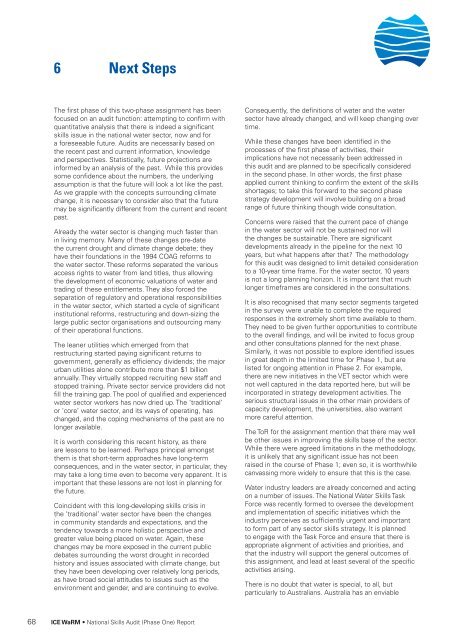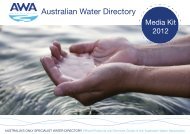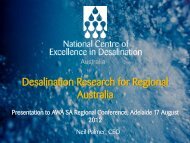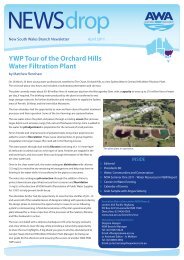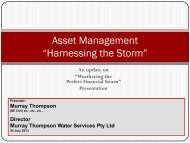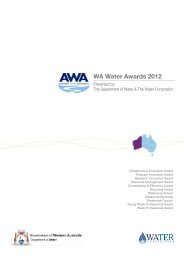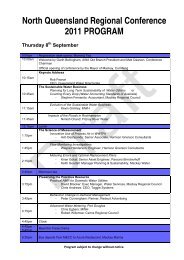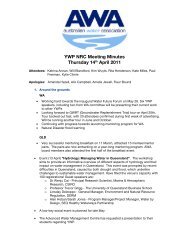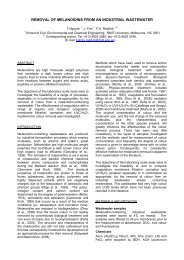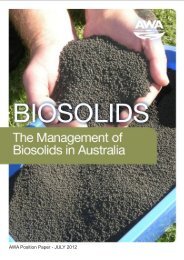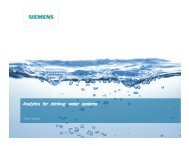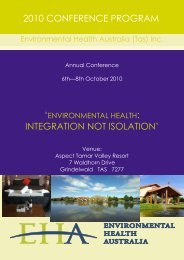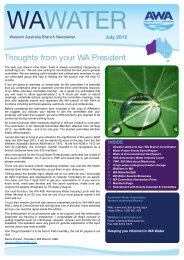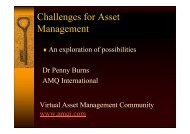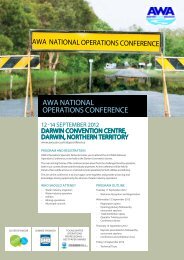National Water Skills Audit - Australian Water Association
National Water Skills Audit - Australian Water Association
National Water Skills Audit - Australian Water Association
- No tags were found...
Create successful ePaper yourself
Turn your PDF publications into a flip-book with our unique Google optimized e-Paper software.
6 Next StepsThe first phase of this two-phase assignment has beenfocused on an audit function: attempting to confirm withquantitative analysis that there is indeed a significantskills issue in the national water sector, now and fora foreseeable future. <strong>Audit</strong>s are necessarily based onthe recent past and current information, knowledgeand perspectives. Statistically, future projections areinformed by an analysis of the past. While this providessome confidence about the numbers, the underlyingassumption is that the future will look a lot like the past.As we grapple with the concepts surrounding climatechange, it is necessary to consider also that the futuremay be significantly different from the current and recentpast.Already the water sector is changing much faster thanin living memory. Many of these changes pre-datethe current drought and climate change debate; theyhave their foundations in the 1994 COAG reforms tothe water sector. These reforms separated the variousaccess rights to water from land titles, thus allowingthe development of economic valuations of water andtrading of these entitlements. They also forced theseparation of regulatory and operational responsibilitiesin the water sector, which started a cycle of significantinstitutional reforms, restructuring and down-sizing thelarge public sector organisations and outsourcing manyof their operational functions.The leaner utilities which emerged from thatrestructuring started paying significant returns togovernment, generally as efficiency dividends; the majorurban utilities alone contribute more than $1 billionannually. They virtually stopped recruiting new staff andstopped training. Private sector service providers did notfill the training gap. The pool of qualified and experiencedwater sector workers has now dried up. The ‘traditional’or ‘core’ water sector, and its ways of operating, haschanged, and the coping mechanisms of the past are nolonger available.It is worth considering this recent history, as thereare lessons to be learned. Perhaps principal amongstthem is that short-term approaches have long-termconsequences, and in the water sector, in particular, theymay take a long time even to become very apparent. It isimportant that these lessons are not lost in planning forthe future.Coincident with this long-developing skills crisis inthe ‘traditional’ water sector have been the changesin community standards and expectations, and thetendency towards a more holistic perspective andgreater value being placed on water. Again, thesechanges may be more exposed in the current publicdebates surrounding the worst drought in recordedhistory and issues associated with climate change, butthey have been developing over relatively long periods,as have broad social attitudes to issues such as theenvironment and gender, and are continuing to evolve.Consequently, the definitions of water and the watersector have already changed, and will keep changing overtime.While these changes have been identified in theprocesses of the first phase of activities, theirimplications have not necessarily been addressed inthis audit and are planned to be specifically consideredin the second phase. In other words, the first phaseapplied current thinking to confirm the extent of the skillsshortages; to take this forward to the second phasestrategy development will involve building on a broadrange of future thinking though wide consultation.Concerns were raised that the current pace of changein the water sector will not be sustained nor willthe changes be sustainable. There are significantdevelopments already in the pipeline for the next 10years, but what happens after that? The methodologyfor this audit was designed to limit detailed considerationto a 10-year time frame. For the water sector, 10 yearsis not a long planning horizon. It is important that muchlonger timeframes are considered in the consultations.It is also recognised that many sector segments targetedin the survey were unable to complete the requiredresponses in the extremely short time available to them.They need to be given further opportunities to contributeto the overall findings, and will be invited to focus groupand other consultations planned for the next phase.Similarly, it was not possible to explore identified issuesin great depth in the limited time for Phase 1, but arelisted for ongoing attention in Phase 2. For example,there are new initiatives in the VET sector which werenot well captured in the data reported here, but will beincorporated in strategy development activities. Theserious structural issues in the other main providers ofcapacity development, the universities, also warrantmore careful attention.The ToR for the assignment mention that there may wellbe other issues in improving the skills base of the sector.While there were agreed limitations in the methodology,it is unlikely that any significant issue has not beenraised in the course of Phase 1; even so, it is worthwhilecanvassing more widely to ensure that this is the case.<strong>Water</strong> industry leaders are already concerned and actingon a number of issues. The <strong>National</strong> <strong>Water</strong> <strong>Skills</strong> TaskForce was recently formed to oversee the developmentand implementation of specific initiatives which theindustry perceives as sufficiently urgent and importantto form part of any sector skills strategy. It is plannedto engage with the Task Force and ensure that there isappropriate alignment of activities and priorities, andthat the industry will support the general outcomes ofthis assignment, and lead at least several of the specificactivities arising.There is no doubt that water is special, to all, butparticularly to <strong>Australian</strong>s. Australia has an enviable68 ICE WaRM • <strong>National</strong> <strong>Skills</strong> <strong>Audit</strong> (Phase One) Report


